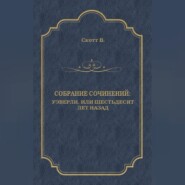По всем вопросам обращайтесь на: info@litportal.ru
(©) 2003-2024.
✖
St. Ronan's Well
Настройки чтения
Размер шрифта
Высота строк
Поля
Slaister, a mess.
Snooded, bound up with a snood or fillet for the hair.
Soop, to sweep.
Sorting, a correction with the hand or the tongue.
“Sossings and soopings,” made-up soups and messes.
Souvenir, a lady's reticule or hand-bag.
Speer, to inquire.
Sponsible, respectable.
Swarf, to swoon.
Syllabub, a curd made of wine or cider with milk or cream.
Taupie, tawpie, an awkward girl, a tomboy.
Tinkler, a tinker.
Titupping, lively, full of spirit.
Tozie, a shawl of goat's wool.
Troke, to traffic, do business with in a small way.
Turbinacious, peaty, turfy.
“Ullah kerim!” God is merciful.
Ultroneous, uncalled for, unusual.
Umquhile, the late.
Unco, very, particular, uncommon.
Usquebaugh, whisky.
Wad, would.
Wae, woful, sad.
Waur, worse.
Wee, small, little.
Weel, well.
Wheen, a few.
Wi', with.
Windlestrae, a small bundle of straw.
Wizzened, withered.
Wunna, will not.
Yestreen, last night.
Yince, once.
THE END
notes
1
p. 1. “David M'Pherson's map.” In his “Geographical History,” London, 4to, 1796.
2
See Editor's Notes at the end of the Volume. Wherever a similar reference occurs, the reader will understand that the same direction applies.
3
See the old Ballad of King Estmere, in Percy's Reliques.
4
In a colloquy of Erasmus, called Diversaria, there is a very unsavoury description of a German inn of the period, where an objection of the guest is answered in the manner expressed in the text – a great sign of want of competition on the road.
5
This circumstance shows of itself, that the Meg Dods of the tale cannot be identified with her namesake Jenny Dods, who kept the inn at Howgate,[49 - p. 11. “Jenny Dods … at Howgate.” Scott admitted to Erskine that the name of “Dods” was borrowed from this slatternly heroine.] on the Peebles road; for Jenny, far different from our heroine, was unmatched as a slattern.
6
This was universally the case in Scotland forty or fifty years ago; and so little was charged for a domestic's living when the author became first acquainted with the road, that a shilling or eighteenpence was sufficient board wages for a man-servant, when a crown would not now answer the purpose. It is true the cause of these reasonable charges rested upon a principle equally unjust to the landlord, and inconvenient to the guest. The landlord did not expect to make any thing upon the charge for eating which his bill contained; in consideration of which, the guest was expected to drink more wine than might be convenient or agreeable to him, “for the good,” as it was called, “of the house.” The landlord indeed was willing and ready to assist, in this duty, every stranger who came within his gates. Other things were in proportion. A charge for lodging, fire, and candle, was long a thing unheard of in Scotland. A shilling to the housemaid settled all such considerations. I see, from memorandums of 1790, that a young man, with two ponies and a serving-lad, might travel from the house of one Meg Dods to another, through most parts of Scotland, for about five or six shillings a-day.
7
Note I. (#pgepubid00049)– Building-Feus in Scotland.
8
Snooded, bound up with a snood or fillet for the hair.
Soop, to sweep.
Sorting, a correction with the hand or the tongue.
“Sossings and soopings,” made-up soups and messes.
Souvenir, a lady's reticule or hand-bag.
Speer, to inquire.
Sponsible, respectable.
Swarf, to swoon.
Syllabub, a curd made of wine or cider with milk or cream.
Taupie, tawpie, an awkward girl, a tomboy.
Tinkler, a tinker.
Titupping, lively, full of spirit.
Tozie, a shawl of goat's wool.
Troke, to traffic, do business with in a small way.
Turbinacious, peaty, turfy.
“Ullah kerim!” God is merciful.
Ultroneous, uncalled for, unusual.
Umquhile, the late.
Unco, very, particular, uncommon.
Usquebaugh, whisky.
Wad, would.
Wae, woful, sad.
Waur, worse.
Wee, small, little.
Weel, well.
Wheen, a few.
Wi', with.
Windlestrae, a small bundle of straw.
Wizzened, withered.
Wunna, will not.
Yestreen, last night.
Yince, once.
THE END
notes
1
p. 1. “David M'Pherson's map.” In his “Geographical History,” London, 4to, 1796.
2
See Editor's Notes at the end of the Volume. Wherever a similar reference occurs, the reader will understand that the same direction applies.
3
See the old Ballad of King Estmere, in Percy's Reliques.
4
In a colloquy of Erasmus, called Diversaria, there is a very unsavoury description of a German inn of the period, where an objection of the guest is answered in the manner expressed in the text – a great sign of want of competition on the road.
5
This circumstance shows of itself, that the Meg Dods of the tale cannot be identified with her namesake Jenny Dods, who kept the inn at Howgate,[49 - p. 11. “Jenny Dods … at Howgate.” Scott admitted to Erskine that the name of “Dods” was borrowed from this slatternly heroine.] on the Peebles road; for Jenny, far different from our heroine, was unmatched as a slattern.
6
This was universally the case in Scotland forty or fifty years ago; and so little was charged for a domestic's living when the author became first acquainted with the road, that a shilling or eighteenpence was sufficient board wages for a man-servant, when a crown would not now answer the purpose. It is true the cause of these reasonable charges rested upon a principle equally unjust to the landlord, and inconvenient to the guest. The landlord did not expect to make any thing upon the charge for eating which his bill contained; in consideration of which, the guest was expected to drink more wine than might be convenient or agreeable to him, “for the good,” as it was called, “of the house.” The landlord indeed was willing and ready to assist, in this duty, every stranger who came within his gates. Other things were in proportion. A charge for lodging, fire, and candle, was long a thing unheard of in Scotland. A shilling to the housemaid settled all such considerations. I see, from memorandums of 1790, that a young man, with two ponies and a serving-lad, might travel from the house of one Meg Dods to another, through most parts of Scotland, for about five or six shillings a-day.
7
Note I. (#pgepubid00049)– Building-Feus in Scotland.
8

















